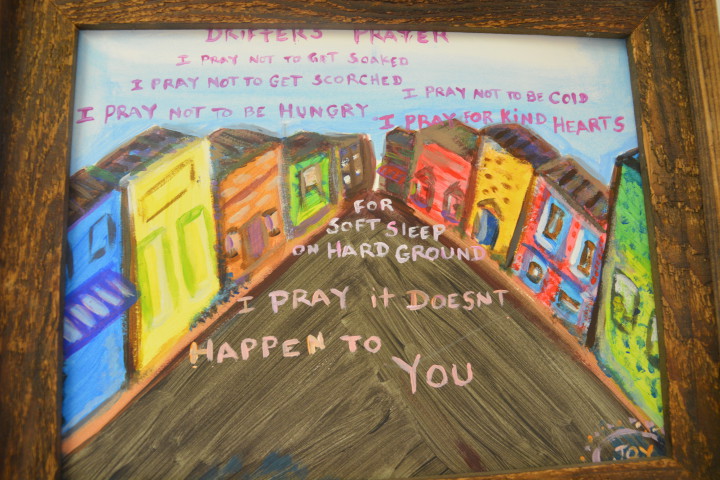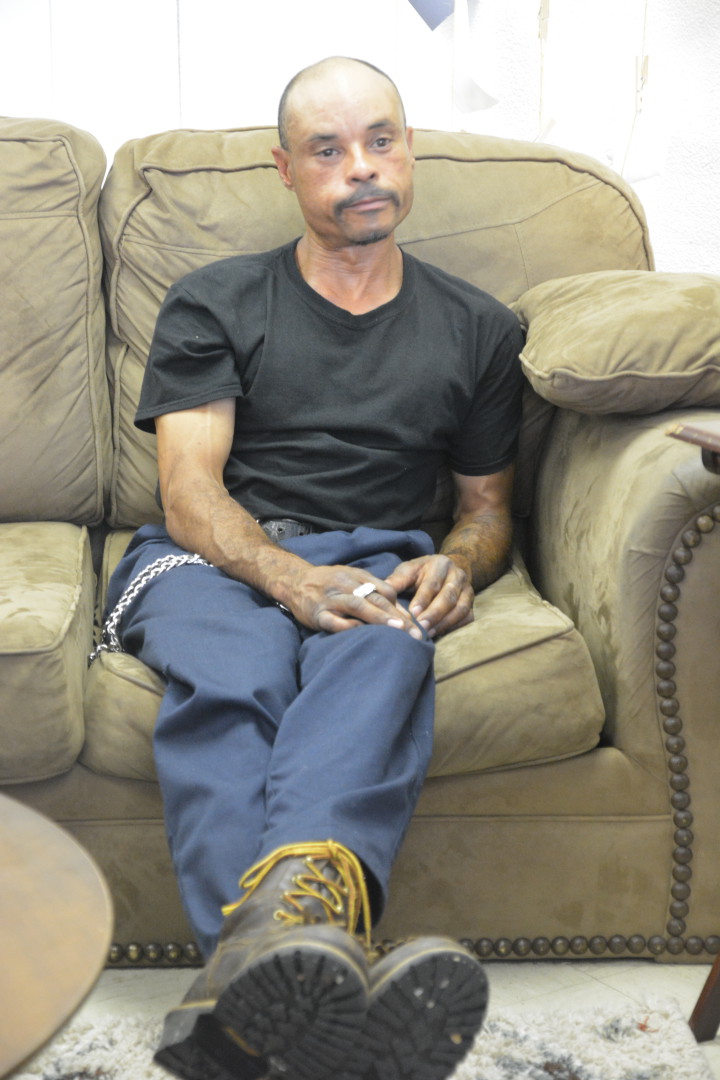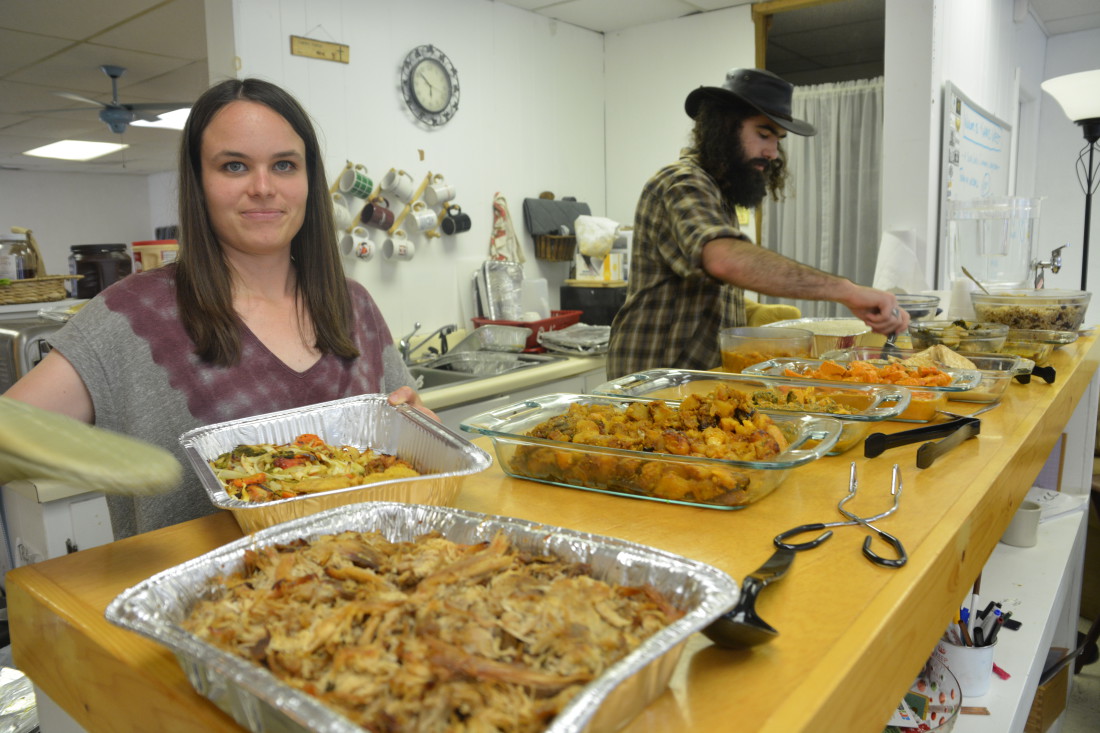Terrence Rumpf, known to his friends as Harley, stretches out on the sofa at Kairos West Community Center, catching a little rest before dinner guests arrive.
He has helped set up for the gathering of people who want to know more about a unique café, and he will help guests understand that this place is about more than the food. He lives on the street, but he finds refuge here in this place where he is respected as a person first.
“I’m human,” he says. “I have dignity. I’m honest, and I have value.”
In a town where tourists come for the food, people who live on the margins of society often feel unwelcome in restaurants, even if they have the money to pay for a meal. Here at 12 Baskets Café, they are welcome and valued.
The food comes from restaurants and other providers who have prepared food and are loath to just throw the leftovers away. The dinner served this night comes from India Garden restaurant and Mission Hospital’s cafeteria, all prepared earlier in the day and picked up that afternoon. The bread is from Annie’s Bakery, and there is enough to send guests home with a loaf each.

The café currently serves lunch on Thursdays at Kairos West Community Center on Haywood Road, but will open for lunch daily during the week in about a month downstairs from the Firestorm Café. The goal is to expand eventually to two meals a day, seven days a week.
The Rev. Shannon Spencer, executive director of the Asheville Poverty Initiative, the parent organization of 12 Baskets, says the idea came about during a conversation with someone from Food Connection, which also distributes food that has been rescued from providers who have prepared it already. “Prepared food has no shelf life,” Spencer says. “You have to freeze it or eat it right away.”
Food Connection found that a lot of food was being wasted because there was no way to get it to people in need, and Spencer decided the food should get to where it could be used. Volunteers pick it up daily from some vendors (Mission Hospital, Earth Fare and India Garden) and occasionally from others (Chai Pani and Annie’s Bakery).
“We are a faith-based organization; we are Christian,” Spencer says. “That doesn’t mean the people we serve need to be Christian. Our actions are driven by our faith, which calls us to serve others.” The name, 12 Baskets, reflects Spencer’s faith — it is from the amount of food left over after Jesus fed the 5,000 — and, she adds, smiling, it sounds a little like 12 Bones (the popular barbecue joint).
The café will serve anyone who comes through the door at no cost, although diners can leave a donation to help cover the cost of running a restaurant. “This is a place where people can come to break bread together,” Spencer says. “That means more than just eating; it means getting to know each other, sharing our stories and creating community.”
Angel Frank has had a place to call home for three years now, but she says she still experiences rejection when people find out she used to live on the street. “It’s like there’s something wrong with me, which there isn’t,” she says. “Anybody can wind up like I was.” Frank tells her story to all who will listen because she believes people need to hear the stories of those who live on the margins of society and to see them as people of value.

Donna Birch came to the dinner to hear that story and to offer her help at the café. She is a retired flight attendant who recently moved to Asheville from Chicago. “I’m used to serving people,” Birch says. “I think everyone deserves to feel like they’re being waited on, especially people who don’t usually get to feel that way.”
Kate Teal and Thomas Fisher came to learn more about how they can help. Teal has experience volunteering with Food Not Bombs in Buffalo, N.Y., and Fisher is a cook by trade. They hope to help in a number of ways and left the dinner even more excited about the prospect of serving than when they arrived.
Spencer prefers the language of companionship over that of volunteerism because saying someone is a volunteer implies that the person he or she is serving is somehow less than the volunteer. The word companion conveys equality. “The real lesson here is that there is an abundance,” Spencer says. “There is plenty to go around. The problem is with distribution, with those who have so much more than they need, and we’re all told that it’s OK to do that, to take as much as you can. … But the more we get to know each other, the less we want to do things that harm each other.”
Everyone is welcome at the café, Spencer says. “Come and be a companion. Come and eat with us, and I promise you will leave with a sense that you have received a gift.”




“I’m human, I have dignity. I’m honest and I have value.”
That quote floored me.
Guess which side of the political spectrum in all it’s theocratic glory has conveniently ignored that idea?
As usual, for being the Internets, cue the ‘hate the poors’ comments.
Please remember to also randomly capitalize certain words and include texting abbreviations that detract from one’s selfish message.
that dude in the photo needs hair and beard netting like they wear at Earf Fare …
Great story!
Thank you for this.